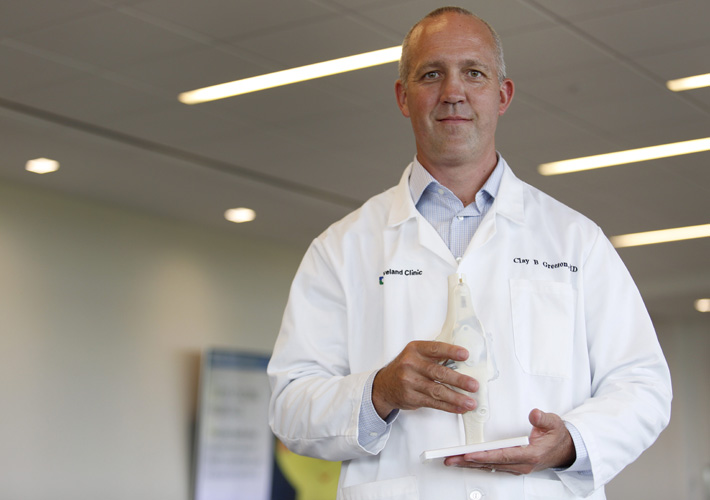
Orthopedic surgeon Dr. Clay Greeson is actively promoting one idea he came here with when he arrived less than a year ago – a systemwide Cleveland Clinic “sports medicine” program – while also advocating a second idea, hoping to convince the hospital group to look into testing a pain-killing procedure for patients with osteoarthritis.
Both could be “tough sells.”
On the surface at least, the demographics of Vero Beach don’t seem ideally suited to support a major sports medicine program.
While Johns Hopkins Medicine does say “almost one-third of all injuries incurred in childhood are sports-related injuries,” Vero’s largest age group has long since left childhood behind them.
Nevertheless, looking at Indian River County overall, Greeson sees “three very good [high schools] in a very small locale, along with a community college, which would be a great footprint for a program. If you add all those kids up, it would be over 4,000 kids.”
Just to our south, however, St. Lucie County – where Cleveland Clinic has two hospitals – boasts five times the number of public and preparatory schools with nearly 10 times the number of students.
Perhaps Greeson’s stronger argument for a sports medicine center rests on Vero’s seniors. With golf, tennis, pickleball, running, hiking, sailing, gyms and a host of other exercise-related options available, Vero’s seniors are often just as active – or possibly even more active – than their counterparts in rest of the county.
Greeson says, “I think we can provide a lot of options to keep people doing the things they want to do. You don’t have to be a high school football player to be considered a sports medicine patient. It should be across the age spectrum, which is what’s exciting for me. I enjoy that part of it. But yes, we want to absolutely go after those targeted ages of the young folks and get them into the clinic as well.”
Whether or not Vero has a large enough potential patient population to warrant establishing a systemwide sports medicine program here remains to be seen.
Meanwhile, on a different front, Greeson is hoping testing can convince the hospital that a very old pain-relieving technique does, indeed, have a place in modern medicine in general, and in treating pain from osteoarthritis in particular, through a system provided by medical device manufacturer Iovera.
In this case, “old” is something of an understatement – it also rhymes with a word that’s the very definition of the therapy. Cold.
As the University of Kansas Health System points out, “using cold to relieve pain is a practice that’s been around since Hippocrates first noted its healing properties in ancient Greece,” but whether or not a newer generation of treatments to harness the power of “focused cold” will succeed is still being debated.
“Iovera works,” says the University of Kansas, “by applying targeted cold to a peripheral nerve. A precise cold zone then forms under the skin – cold enough to immediately stop the nerve from sending pain signals while avoiding damage to the surrounding tissue. Pain relief from this process typically lasts between three to five months.”
Iovera’s devices, according to the company’s website are, “used to destroy tissue during surgical procedures by applying freezing cold. It can also be used to produce lesions in peripheral nervous tissue by the application of cold to the selected site for the blocking of pain.”
If that sounds a lot like “cryotherapy” to you, you’re quite correct. “It is,” says Greeson, “a form of cryotherapy.”
For patients with osteoarthritis-related knee pain, Greeson claims the Iovera treatment “temporarily stuns the sensory nerves around the knee.”
“If it does that,” he continues, “it could likely have a positive influence on things like hospital stay, length of stay and recovery time.”
And, if it does perform as advertised, this modern-day cryotherapy could have a big impact by reducing the use of pre- and post-operative opioid prescription drugs.
That said, Greeson freely admits, “we need to know if this works and whether or not it is an effective treatment and what the adverse events are.
“This hasn’t been studied in a robust, randomized controlled trial fashion,” concludes Greeson. “I know that the Cleveland Clinic is hoping to initiate that, and we would love to be a part of it.”
Dr. Clay Greeson is an orthopedic surgeon and sports medicine physician with Cleveland Clinic Indian River Hospital. His office is in the hospital’s Health & Wellness building at 3450 11th Court in Vero Beach. The phone number is 772-794-1444.



